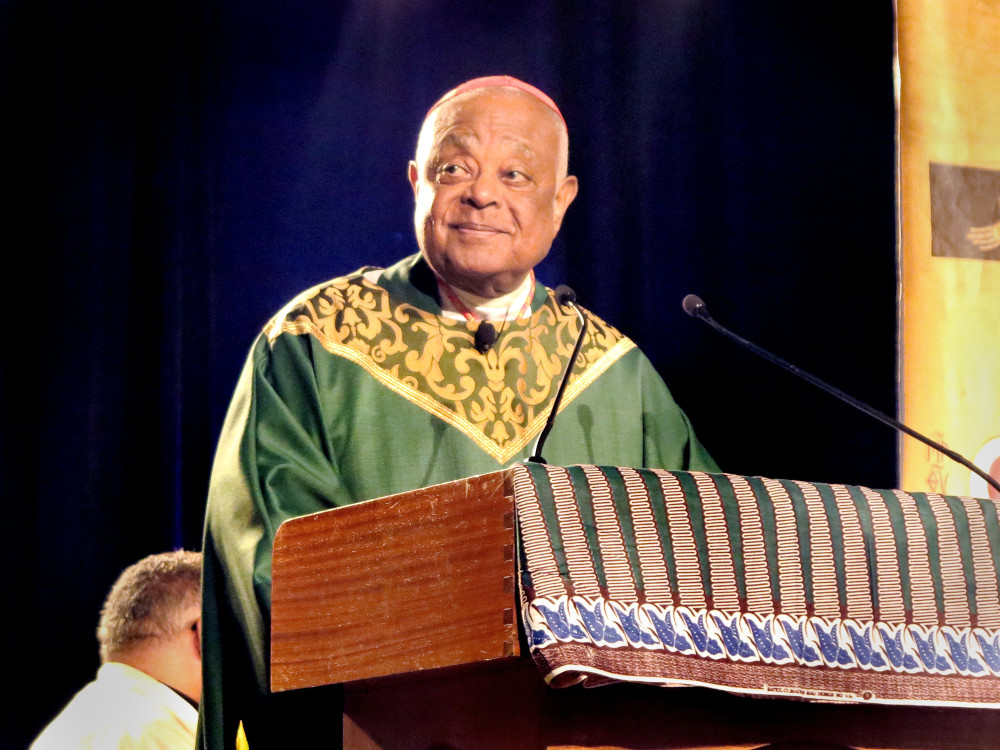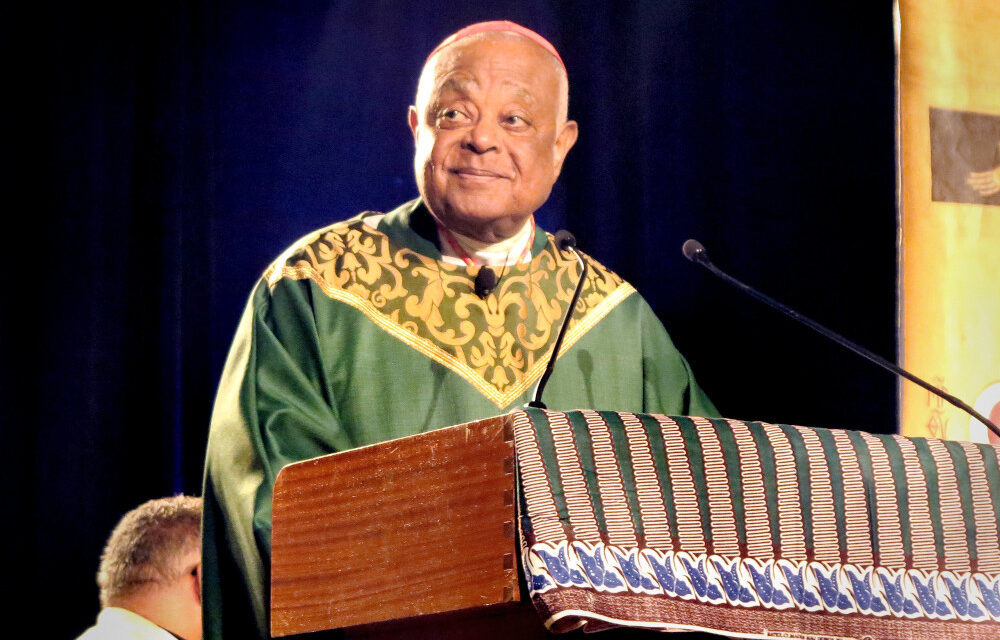
In order to consider the parables of Jesus Christ with empathy, keep in mind the fullness of Jesus’ humanity and ability to tell stories with a sense of humor, Cardinal Wilton D. Gregory of Washington said in a July 16 homily.
The cardinal, who is the first African American Catholic named a cardinal, was the main celebrant of the Mass of thanksgiving opening the Knights of Peter Claver and Ladies Auxiliary annual convention in New Orleans.
The organization’s 107th National Convention, taking place through July 19, marked the first national gathering of all six divisions of the organization and featured workshops, seminars and charitable events. The Claver Knights and Ladies are a family-based Catholic organization formed by the Black Catholic tradition and open to Catholic men, women and youth of all racial and ethnic backgrounds.
Concelebrants at the opening Mass, which was televised on EWTN and on the Knights’ Facebook page, included New Orleans Archbishop Gregory M. Aymond, Chicago Auxiliary Bishop Joseph N. Perry and other priests.
In his homily, Gregory’s focus was Jesus’ parable of the sower, which appears in three of the four Gospels of the Bible.
“Do you suppose that Jesus had a good sense of humor?” the cardinal asked. “That he enjoyed playing tricks or jokes with people? Would Christ pull someone’s leg? What did Jesus’ laughter sound like?”
Gregory acknowledged he had long “taken comfort in the thought that Jesus may be a lot like me, except for my rough edges.”
Farmers he has known, the prelate added, “work very diligently to prepare the soil so that the seeds fall on as much good earth as possible.”
But in Jesus’ parable, the sower “allowed the seed to fall wherever it could” among weeds and rocks, which is “not a very efficient way to conduct agricultural business,” he said.
To understand the parable then, the cardinal continued, “we have to catch the obvious twinkle in Jesus’ eye as he communicates the mystery to his listeners about God’s kingdom, to use the image of the farmer.”
Frequently, Gregory said, “the word of God asks us to laugh at ourselves. We are the field filled with rocks, weeds, old tires, broken glass, discarded cans and so many thorns. Our hearts are unyielding soil that doesn’t allow God’s word to penetrate and to take root and, when we do, the harvest is often meager and less than what it ought to be. … We know what we’re supposed to do as disciples (love our neighbor, work for justice, care for the poor, etc.), but we are not very good at or very consistent with our follow-through.”
“It’s as though Jesus is telling us this story about God’s words and our own thorny lives,” Gregory said, “and then is asking us, ‘Do you get it folks? Is anybody out there? A man like us in all things but sin!’ When we finally do meet him in judgment, I really do hope that he still is able to laugh!”
Humor, the cardinal has found, is not characteristic of some Catholics he’s encountered, calling them “not very joyful people. They don’t seem to find much to laugh about in life. They take themselves so seriously, and many of them hardly ever crack a smile.”
This has led him, on more than once occasion, to want to ask, “My friend, if the love of God is in your heart, would you kindly inform your face?
Gregory praised the Knights of Peter Claver and Ladies Auxiliary for the family-based fraternal order’s endurance in its earliest years.
“When many questioned our human dignity, your faith never wavered, although it was often sorely tried,” he said, adding the order has long since become an indispensable part of Catholic Church life in our nation, born “when other Catholic fraternities would not welcome people of color.”
The Knights of Peter Claver was founded in Mobile, Alabama, in 1909 with the support of the Josephites, but is now based in New Orleans. It was named after St. Peter Claver, a Spanish Jesuit priest who ministered to Africans in Colombia under slavery during the 1600s, sharing in their sufferings as much as possible, and raising his voice for justice against slavery, including calling slavers to repent of their crimes.
Like their namesake saint, the Claver Knights and Ladies today have a specific commitment to defend the sanctity of every human life, from conception to natural death, and particularly the human dignity of people poorly served on the margins of human society.
“This conference brings together the past alongside the future, and we thank God for both (the Knights and Ladies), and we pledge him our trust and love as did our forerunners from yesterday who obviously did that as they established and carried on a noble and enduring example of true Catholic faith,” said Gregory, a fourth-degree Knight of Peter Claver. “May we be as faithful, loving and steadfast as they were.”
He sees the Knights as extremely important “to the proclamation of the faith in bringing together extraordinarily good men and women who want to do something for the faith and to engage the church with our culture, our traditions, our zeal and passion.”
“Our people have faith and determination, and it was out of that faith and determination that the Claver family was born,” he added. “The founding people were convinced it was important that African American Catholics would be able to celebrate our identity in a collaborative way, and to make a statement to the whole church.”
Gregory, a papal appointee to the upcoming synod — his fourth synod — said he also would be participating in two other upcoming gatherings where African-American Catholics would celebrate their faith: the 13th National Black Catholic Congress July 20-23 and the African Eucharistic Congress July 21-23. The gatherings are being held, respectively, in a suburb of Washington and in Washington itself.
The cardinal described the synod in October as unlike the others he’s attended due to the large delegation of lay, religious and clergy who are not bishops but have a vote. At previous synods, they could only attend and speak.
“This synod engages all the participants in an active way with the synod as voters,” Gregory said. “The goals of this one include an engagement of the broader church — clergy, religious, laity and hierarchy — to speak to one another and listen to one another about issues of importance about the evangelization of the world. What I think (the pope) would like us to do is to open our hearts and minds to the prompting of the Holy Spirit so we can better evangelize the world.”
The New Orleans conference was the first in the Knights of Peter Claver’s 114th-year history to include its junior, third- and fourth-degree Knights and the Ladies Auxiliary in the same place and time.
Approximately 1,700 Knights and Ladies Auxiliary members attended and discussed a myriad of topics including all facets of what it means to be pro-life while holding an end-to-gun violence rally, conducting community service, holding fundraisers, medical panels and, for the first time, a wellness component to promote healthy lifestyles, said Athanase Jones, a lay board member and public relations committee member.
Knights of Peter Claver Ladies Auxiliary Court 330 Grand Lady Janice Collins of New Orleans said she has attended several national Knights’ conventions and enjoys them. The conventions, she said, promote unity while highlighting the wonderful works of the fraternal organization. Having the Junior Knights at the convention for the first time, she added, helps the older Knights serve as role models.
“Friendship, unity and charity are the three virtues of our whole organization,” Collins told the Clarion Herald, the New Orleans archdiocesan newspaper. “We share ideas between the organization, make resolutions and see where we can better our organization.”





